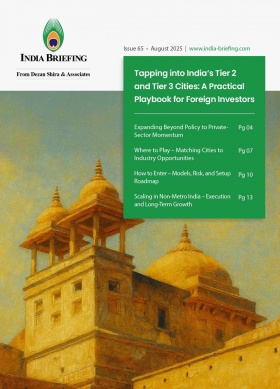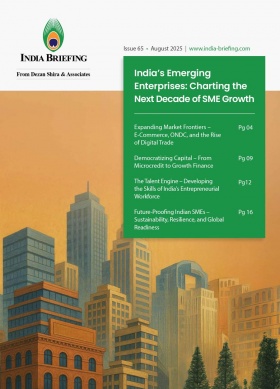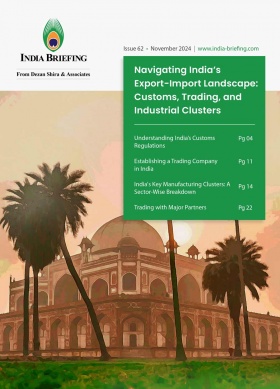Chennai Investment Brief: What Makes the City a Top FDI Hub
Chennai, Tamil Nadu, has evolved beyond its automotive roots. Its ability to attract foreign investment lies in the confluence of infrastructure, human capital, policy support, and supply-chain depth, which makes Chennai a key gateway to India’s southern growth corridor. For investors and companies seeking to tap India’s dynamic market and export-oriented manufacturing base, Chennai is a location worth serious consideration.
Chennai, the capital of Tamil Nadu, stands among India’s most diversified and globally connected industrial cities. With a well-developed infrastructure network, strong human capital, and growing inflows of foreign direct investment (FDI), Chennai has emerged as a leading destination for advanced manufacturing, innovation, and logistics in South India. The city’s geographic advantage on the Coromandel Coast, complemented by excellent access to nearby industrial and innovation hubs, makes it a cornerstone of India’s southern growth corridor.
City overview: Economic strengths and industrial heritage
Chennai has long been recognized as the “Detroit of India,” owing to its extensive automotive and auto component ecosystem. Over time, however, the city has transcended its automotive identity to host a diverse portfolio of industries – from electronics and IT to renewable energy, aerospace, and pharmaceuticals.
According to the Department for Promotion of Industry and Internal Trade (DPIIT), Tamil Nadu is one of India’s leading FDI-receiving states; it ranked fifth nationally in FY 2024-25, receiving INR 311.03 billion in foreign equity inflows. Chennai accounts for a substantial share of these inflows due to its strategic coastal location, skilled workforce, and pro-business policies.
Major industries operating in the Chennai metropolitan area include automotive, electronics, IT and business process outsourcing (BPO), financial services, logistics, and renewable energy. Surrounding satellite towns such as Sriperumbudur, Oragadam, and Mahindra World City further extend the industrial footprint, offering plug-and-play infrastructure, connectivity to ports, and access to industrial land with state support.
Tamil Nadu’s Investment Appeal
In September 2025, the Tamil Nadu government reported that a recent overseas investment mission to Europe (Germany and the UK) yielded INR 155.16 billion in investment commitments, with 33 MoUs and the potential creation of 17,600 new jobs. Among these, 10 new companies have committed to invest in Tamil Nadu, and six entities plan joint ventures in MSME and higher education sectors.
Infrastructure and connectivity
Ports and maritime trade
Chennai’s maritime infrastructure anchors its export-oriented economy. The Chennai Port, India’s third-oldest port, began commercial operations in 1881. It is among the country’s busiest government-run ports, handling containerized, breakbulk, and automobile exports. Nearby, the Kamarajar (Ennore) Port functions as a deep-draft facility catering to bulk cargo, liquid fuels, and roll-on/roll-off (Ro-Ro) automobile shipments. Together, these twin ports give the city unmatched access to global shipping routes, including Southeast Asia, the Middle East, and East Africa.
Industrial estates and SEZs along the GST Road and NH 45 corridor enjoy direct connectivity to these ports, minimizing logistics turnaround time for exporters in electronics, automobiles, and engineering goods.
Airports and air cargo
Located in Tirusulam in Chengalpattu district, in the Greater Chennai Metropolitan Area, and around 21 km (13 mi) southwest of the city center, Chennai International Airport serves as a major passenger and cargo hub for southern India. Handling over 20 million passengers and nearly 400,000 tonnes of freight annually, the airport supports global connectivity for technology, manufacturing, and pharmaceutical firms.
To meet rising demand, a greenfield airport project at Parandur (Kanchipuram district) has been approved, though delays around land acquisition may push completion date to 2030. Spanning more than 4,500 acres – the new airport will handle up to 100 million passengers per year upon completion. It is expected to bolster Chennai’s logistics and MRO (maintenance, repair, overhaul) capabilities, reinforcing its attractiveness to high-tech and export-driven sectors.
Urban transit and industrial corridors
Chennai’s Phase II Metro expansion, covering 118.9 kilometers (73.9 mi), is under implementation and will significantly improve urban mobility and connectivity between industrial clusters, residential areas, and the airport.
The city also serves as the eastern gateway to the Chennai-Bengaluru Industrial Corridor (CBIC), one of India’s flagship infrastructure projects. This corridor connects Chennai to Bengaluru and extends toward Mumbai, forming part of the national industrial corridor network. The corridor integrates road, rail, and port infrastructure – helping industries around Sriperumbudur, Oragadam, and Ranipet move goods seamlessly across southern India.
Additionally, the Chennai Peripheral Ring Road (CPRR) and Outer Ring Road projects will decongest the city’s urban core and improve freight and multimodal logistics movement between ports (Ennore, Kattupalli) and industrial hubs (for example: Sriperumbudur and Oragadam).
Recent foreign investment highlights in Chennai
Foreign investors are increasingly choosing Chennai for both advanced manufacturing and technology-driven innovation. Several recent projects, spanning sectors as diverse as energy, aerospace, logistics, and retail technology, collectively reinforce Chennai’s image as a high-value and innovation-driven investment destination.
- Hitachi Energy: In October 2025, Hitachi Energy announced a INR 2,000 crore (US$240 million) expansion of its Global Technology and Innovation Centre in Chennai, creating approximately 3,000 high-value technology jobs. The center serves as one of Hitachi’s global hubs for energy transition research, grid automation, and transformer design, managing over 1,000 projects across 46 countries.
- Walmart: Walmart’s India tech arm (WM Global Technology Services India Pvt Ltd) has leased around 465,000 sq ft of office space in the International Tech Park Chennai (ITPC), making it one of the company’s largest tech footprints in South India. The expansion underscores Chennai’s growing talent pool and cost efficiency in comparison with Bengaluru and Hyderabad. The deal reinforces Chennai’s increasing attractiveness for global capability centers, especially in the technology, services, and R&D space.
- TASE Global: Headquartered in Chennai, TASE Global has announced a US$30 million expansion combining an organic brownfield facility in Sriperumbudur (investing US$18 million) and the acquisition of an aerospace firm in Arizona (US$12 million). This project reflects Chennai’s deepening role in global aerospace and defense supply chains. Trusted AeroSpace Engineering TASE Global already supplies precision aerospace components (sheet metal, machining, casings & housings) for aerospace, medical and industrial applications from its Indian unit. Its clients include Boeing, Airbus, and Honeywell. Its Chennai units focus on machining and surface treatment.
- Michelin: The tire manufacturer continues to expand its Chennai production unit, investing an additional INR 5.64 billion to upgrade facilities and manufacture passenger-car radial (PCR) tires. The total investment to date in the Chennai plant is reported to be around INR 28.4 billion.
- IndoSpace: The logistics and warehousing developer has already invested approximately US$380 million in Tamil Nadu and plans to raise that to about US$536 million. Of IndoSpace’s 15 Tamil Nadu parks, 14 are located in or around Chennai, reflecting sustained demand for industrial and e-commerce logistics facilities.
Chennai’s strategic proximity to key industrial hubs
A major reason for Chennai’s attractiveness lies in its geographic centrality within southern India’s industrial triangle. A dense network of industrial linkages allows investors in Chennai to benefit from shared supply chains, labor pools, and innovation ecosystems – without duplicating capital infrastructure across multiple cities.
- Sriperumbudur and Oragadam: Located approximately 40–50 km from central Chennai, these areas form the heart of Tamil Nadu’s automotive and electronics manufacturing ecosystem. They host major global players such as Hyundai, Foxconn, Daimler, Renault-Nissan, and Flex. Their connectivity to the Chennai Port via the Outer Ring Road ensures smooth export logistics.
- Mahindra World City (Chengalpattu District): Positioned about 60 km south of Chennai, this integrated industrial township houses global firms like BMW, Infosys, Fujitec, Renault-Nissan, and Lincoln Electric. Its proximity to both the GST Road and the upcoming PRR makes it ideal for export-oriented manufacturing.
- Siruseri and OMR IT Corridor: The Old Mahabalipuram Road (OMR) corridor, just south of the city, serves as Chennai’s technology and knowledge hub. It hosts software parks, R&D centers, and business campuses of global IT firms including Cognizant, TCS, Capgemini, and Amazon.
- Bengaluru (approx. 350km west of Chennai): The new Bengaluru-Chennai Expressway – expected to be fully operational in 2026 – will reduce travel time between the two cities to less than four hours. This corridor strengthens Chennai’s integration with Bengaluru’s innovation ecosystem, enabling cross-regional collaboration in R&D, electronics, and start-ups.
- Tuticorin and Hosur: While Tuticorin (Thoothukudi) serves as a complementary deep-water port further south, Hosur (on the Tamil Nadu-Karnataka border) functions as a satellite industrial town within a day’s logistics reach from Chennai, offering diversification options for manufacturers.
– With its deep-water port, logistics advantages, and state-backed industrial parks, Thoothukudi is positioning itself as a gateway for export-led manufacturing and green industry growth in South India. The city has evolved into a diversified industrial hub anchored by maritime, electronics, and renewable energy sectors. Major investors include Sembcorp (INR 213.4 billion in renewables), Reliance Consumer Products (INR 11.56 billion FMCG facility), Cochin Shipyard and Mazagon Dock (INR 300 billion combined shipyard projects), and Kaynes Circuits (INR 49.95 billion electronics plant). At the 2025 investors’ conclave, 41 MoUs worth over INR 325 billion were signed.
– Hosur has emerged as a major industrial hub driven by strong automotive, electronics, aerospace, and renewable energy sectors. The region hosts global and domestic firms such as Tata Electronics, Kanthal (Sweden), Panattoni (EU), and Ascent Circuits, with investments in advanced manufacturing, logistics, and high-tech production. In September 2025, Tamil Nadu signed MoUs worth over INR 243 billion for new projects in Hosur, expected to create nearly 50,000 jobs. Its proximity to Bengaluru, robust infrastructure, and investor-friendly policies make Hosur a preferred destination for global supply-chain and manufacturing expansion
Policy environment and incentives
The Tamil Nadu government has cultivated a reputation for stable, investor-friendly governance. Its strong fiscal discipline and policy continuity provide confidence for long-term investors; a key advantage compared to other fast-growing states. Through its Guidance Tamil Nadu agency, the state provides a single-window clearance system for industrial approvals and customized incentives for large investments.
Key policies that benefit Chennai-based investors include:
- Tamil Nadu Industrial Policy 2021: Offers structured incentives for priority sectors, including electronics, electric vehicles (EVs), renewable energy, and aerospace.
- EV Policy 2023: Provides capital subsidies, reimbursement of SGST, and power-tariff concessions for EV and battery manufacturers.
- Data Centre and FinTech Policies: Facilitate land allotment, reduced electricity tariffs, and incentives for IT and digital infrastructure developers.
Key sectors for investment
Chennai’s economy offers several high-growth sectors that attract both domestic and international investors. Strategic government incentives, robust infrastructure, and strong export orientation make these sectors particularly attractive:
1. Automotive and EVs: Chennai remains India’s leading automotive hub, hosting global OEMs like Hyundai, Renault-Nissan, and BMW. The city is rapidly evolving into an EV manufacturing base, supported by the Tamil Nadu EV Policy 2023, which offers incentives for EV production, battery assembly, and component manufacturing. Local R&D centers are also developing next-generation mobility technologies, making Chennai integral to India’s clean transportation roadmap.
2. Electronics and semiconductors: The Sriperumbudur-Oragadam belt has emerged as one of India’s top electronics manufacturing clusters, housing companies such as Foxconn, Flex, and Dell. The state’s Electronic Hardware Manufacturing Policy and integration with India’s PLI schemes for mobile and semiconductor manufacturing position Chennai as a vital node for global electronics supply chains.
3. Information technology (IT), BPO, and FinTech: The Old Mahabalipuram Road (OMR) / Rajiv Gandhi Salai, also known as the “IT Expressway,” is home to top global IT service providers, including TCS, Infosys, Paypal, Cognizant, Capgemini, Wipro Technologies, and commercial hubs like the Tidel Park, ELCOSEZ in Sholinganallur, and Chennai ONE IT Park. Chennai’s emerging FinTech ecosystem, bolstered by the Tamil Nadu FinTech Policy, offers opportunities in digital payments, AI-driven financial services, and cybersecurity solutions.
4. Global capability centers (GCCs): The city’s engineering expertise and workforce strengths make Chennai home to several hundred GCCs, including Walmart, Caterpillar, Hitachi Energy, Societe Generale, AstraZeneca, Pfizer, Roche, Ford, Renault Nissan, Adidas, Mizuho, UPS, Harman, Deloitte USI, AT&T, Standard Chartered, and World Bank Group (the largest outside its HQ).
5. Renewable energy and cleantech: Tamil Nadu leads India in renewable energy capacity, particularly wind and solar. Chennai’s industrial ecosystem supports manufacturing of renewable components, smart grids, and battery storage solutions. Investments by Hitachi Energy and other clean-tech multinationals highlight the city’s growing reputation as a hub for sustainable technology innovation.
6. Aerospace and defense manufacturing: Chennai is part of India’s expanding aerospace and defense value chain, with firms like TASE Global and Ashok Leyland’s defense unit contributing to both domestic and export-oriented production. The government’s Aerospace and Defense Industrial Policy encourages investments in MRO, avionics, and precision engineering facilities near Sriperumbudur and Hosur.
7. Pharmaceuticals, BioTech, and medical devices: With established industrial zones and R&D infrastructure, Chennai is a leading exporter of formulations, APIs, and medical devices. The nearby Oragadam and Chengalpattu regions (part of the larger Chennai Metropolitan Area) host life sciences parks and manufacturing facilities catering to both domestic demand and global supply chains.
8. Logistics, warehousing, and industrial real estate: As a key port city (major ports of Chennai Port and the Kamarajar Port (Ennore Port) and minor port of Kattupalli Adani Port) with strong multimodal connectivity, Chennai offers immense potential in logistics and warehousing. Developers such as IndoSpace and ESR are scaling up operations to serve the growing e-commerce, manufacturing, and cold-chain logistics markets. The city’s proximity to industrial corridors enhances its appeal for integrated industrial townships.
9. Start-ups and technology innovation: Chennai’s start-up ecosystem, supported by initiatives like the Tamil Nadu Start-up and Innovation Mission (TANSIM), is gaining momentum in sectors such as AI, robotics, IoT, and SaaS. Collaborations between academia, industry, and government are strengthening its innovation pipeline and attracting venture capital interest.
Our market entry strategy services guide companies through the full process—helping them design an optimal corporate structure, navigate regulatory environments, and build efficient supply chains tailored to their expansion goals. Reach our experts at: India@dezshira.com
About Us
India Briefing is one of five regional publications under the Asia Briefing brand. It is supported by Dezan Shira & Associates, a pan-Asia, multi-disciplinary professional services firm that assists foreign investors throughout Asia, including through offices in Delhi, Mumbai, and Bengaluru in India. Dezan Shira & Associates also maintains offices or has alliance partners assisting foreign investors in China, Hong Kong SAR, Vietnam, Indonesia, Singapore, Malaysia, Mongolia, Dubai (UAE), Japan, South Korea, Nepal, The Philippines, Sri Lanka, Thailand, Italy, Germany, Bangladesh, Australia, United States, and United Kingdom and Ireland.
For a complimentary subscription to India Briefing’s content products, please click here. For support with establishing a business in India or for assistance in analyzing and entering markets, please contact the firm at india@dezshira.com or visit our website at www.dezshira.com.
- Previous Article India Climate Risk Advisory: Localizing Your Business Continuity Plans
- Next Article How Amazon Inc. Built its India Fulfilment Empire












